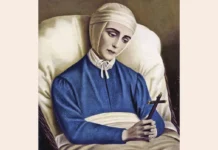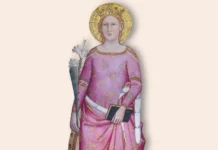Under the warm rays of divine love, the beautiful and elegant young lady was transformed into the “virtuous woman” (Eccl 26:2), who stood undaunted amid the waves of adversity, aridity, persecution and anxiety.
The island of Noirmoutier emerges like the prow of a ship from the waters of the Atlantic Ocean, not far from the mouth of the Loire River.
The island is separated from the continent by a narrow sea channel. In 1770 it was found that it could be reached by foot during low tide, following a one-league trail along the exposed sea floor. The sinuous path, however, was only passable during short interludes, and only by audacious adventurers.
However, courage was not a rare quality among the population of this region of France, who stood out for their bold and combative character, and their robust, sincere, and unshakeable faith.
In 1793, when the Terror assailed France, this people remained faithful to their beliefs. On the eve of the Revolution, religion became their most prized possession. “Although the world was changing around them, society was being shaken and the monarchy overthrown, the rural people […] were not overwhelmed. Rather, they placed their confidence in their churches, their crucifixes and their priests, and so we saw them rise up, ready for everything; for death, for martyrdom.” 1
In January of the following year, the patriots seized Noirmoutier for the second time and massacred its entire garrison, together with most of the civil population. All the priests were shot and many of the churches were razed. During the successive months dominated by the Terror, the number of the island’s victims reached over 1,200.
A lily born in the tempest
It was within this climate of persecution in Noirmoutier, on July 31, 1796, that the daughter of Anne Mourain and Julien Pelletier came into the world, like an innocent lily sprouting in the tempest.
Her parents secretly baptized her on the day of her birth, giving her the name Rose Virginie. It was only the following year, when the first priest arrived on the island, that she received the blessing of a sacred minister, confirming the validity of the Sacrament that she had received in such a simple manner.
Little Rose’s childhood was deeply marked by the events of the time. Her parents, natives of Soullans, had transferred to Noirmoutier in 1793, owing to suspicions aroused by their dedication to the endangered priests of their city. All the consecrated religious who exercised their ministry on the island—and with whom the girl had frequent contact—were true confessors of the faith, who had faced untold trials for love of the Church.
To the eyes of Rose Virginie, these persons had the special value that only suffering imparts, indelibly engraving on her young heart the importance and dignity of sacrifice and heroism. These impressions helped to deeply mould her personality, contributing to the complete acceptance with which she would later respond to Providence’s calling.
“I must conquer myself, but I will be a religious!”
In fact, the voice of God sounded early in the depth of her pure and generous soul. In 1807, shortly after her First Communion, Rose clearly heard an inner calling to the way of perfection. However, she knew that in order to obtain this objective she would have to win harsh struggles and that the most arduous of all battles would be waged against a formidable adversary: her own temperament.
Hers was a vivacious character, given, at times, to extremes in the impertinence of her replies and the desire to do her own will. But her conscience quickly rebuked her for her faults, and she atoned for them with penances.
The ocean—a wordless yet eloquent companion—also evoked salutary impressions to her sensitive spirit. As she walked along the coast watching the successive waves crashing fiercely against the rocks she would become caught up by the immense aquatic expanse. Life, which was opening before her, seemed like a turbulent ocean, filled with peril and uncertainty, in which only those who know how to fight prevail.
The constant war against her own defects came from this fighting concept of life and the irrevocable decision to fulfill her declared ideal, as she herself disclosed to one of the sisters entrusted with her education: “I know that I must conquer myself, but I will be a religious.” 2

God tries those whom He loves
God tries those whom He loves, from an early age. This sign of predilection accompanied the childhood and adolescence of Rose Virginie. In 1805 she lost her favourite sister, Victoria Emilie, and in the following year death also took her father.
The loss of Julien Pelletier left the weight of the children’s education on the shoulders of his widow. In her difficulties she decided to return to Soullans and confide Rose Virginie’s education to a childhood friend, Mother Pulchérie Chobelet, foundress of the Christian Association in Tours, dedicated to the education of youth. The small girl of ten had to leave her beloved island of Noirmoutier and also suffer separation from her family.
The school setting was far different from the consolations enjoyed in the familiar home setting. Mother Pulchérie treated the students with excessive harshness, yet God used this situation to form Rose’s soul, preparing her for a great mission. Before becoming a foundress and superior, it was necessary that she practice obedience and accept humiliations as an efficacious means of subduing her own will, and of obeying with true submission, in order to later command with genuine authority.
The dream is transformed into an invitation
The greatest fruit of her stay in Tours, however, was the clear revelation of her vocation. Close to where she lived, a building with austere walls played on the young girl’s mind, exerting an inexplicable attraction over her. It was the Shelter of Our Lady of Charity, belonging to the congregation founded by St. John Eudes to receive dissolute girls or those in perilous situations, who wanted to make amends for past transgressions and begin a new life.
The institution’s charism struck a chord with the aspirations of the young girl, who longed to conquer souls for Jesus. Her dream of religious life was now transformed into a clear invitation to give herself to God in this work of St. John Eudes.
On October 20, 1814, Rose Virginie Pelletier entered the Shelter of Tours as a postulant. In the first few months, the 18 year-old surprised the community by demonstrating a maturity beyond her years. She was given the task of teaching catechism to the “Penitents”, the young women who lived in the shelter. She carried out this responsibility successfully, with all the enthusiasm of her apostolic soul.
Upon admission to the novitiate, in which the postulant was clothed with the Congregation’s white habit, it was also customary to take a new name. Rose Virginie chose St. Teresa of Jesus, whom she greatly admired. However, the superior was of a different opinion and, to give her a lesson in humility, objected: “Do you want the name of such a great saint? Do you, a poor and little aspirant to religious perfection, assume to put yourself on her level?” And she decreed: “Go and look in the Lives of the Saints for the most humble and hidden one.” 3 Rose obeyed without murmuring and chose as her patroness St. Euphrasia, a religious of modest life.
Sister Mary Euphrasia stood out for her docility toward her superiors. Her cheerfulness was revealed at recreation; she showed respectful attentiveness to the elderly sisters, radiating around her the overflowing joy of her soul. “I cannot remember her without awakening the reminiscence of her heroic virtues, which I saw her practice as a novice, giving the older Mothers the hope that she would be the glory and honour of our Congregation,” 4 wrote one of her companions.
Superior of the Shelter of Tours
After her religious profession, in 1817, Sister Euphrasia received the crucial office of Mistress of the “Penitents”. Gifted with a balanced charism for guidance, she frequently joined her charges in conversations and walks, making every effort to provide pleasant recreations. However, in matters touching on God’s Law, she proved to be so severe and unswerving that they preferred any penance to a look of admonishment from the mistress. “She had a way that was both imposing and engaging, which won over all hearts,” 5 commented one of her confessors.
In this way, loved and respected, she acquired such esteem within the community, that when the Chapter gathered in 1825 to choose a new Superior, she was unanimously elected, before reaching the age of 29.
This elevation of office pressed upon her humility and her resolution of obedience. However, her opinion of her own insignificance did not prevent her from exercising her authority with resolution, as was evidenced by her decision to institute the “Magdalens”.
During her years of experience among the “Penitents”, she had sadly noted that many of these young women, truly converted, desired to complete their amendment of life by embracing the religious state, yet there was no Institute to receive them. The saint saw the urgency of opening a Congregation, protégé of the Shelter, destined to accept these vocations.
When Mother Mary Euphrasia announced the project of the foundation, the Community Council offered several objections. But convinced that she was following an inspiration of the Holy Spirit, she declared: “You have appointed me Superior: I am unworthy, I am perplexed; however, since I am the Superior, we will found the Magdalens.” 6
Before long the new work came into being and the number of vocations surpassed the expectations of the foundress.
The Good Shepherd of Angers
However, this daring undertaking did not satiate Mother Mary Euphrasia’s thirst for souls; her accomplishments never seemed to meet her apostolic desires. It could be said that the world was too narrow for her unbounded zeal; her ardent soul in some way participated in Jesus’ infinite love for sinners.
But God who fostered these inner desires did not fail to provide the means for their fulfillment. In 1829, the sisters of Tours were invited to open a Shelter in the city of Angers and establish themselves in the old building of the Good Shepherd. Filled with vibrant joy, Mother Euphrasia immediately accepted and moved there, in order to organize the nascent monastery.
The first months were hard, for lack of material resources, but once these obstacles were overcome, the “era of miracles” 7 began for the Shelter of the Good Shepherd: donations poured in, vocations multiplied and a beautiful chapel was erected.
With the new community established in Angers, the holy Mother cherished the dream of expanding the activity of the order beyond the French and European borders. However, the administrative autonomy of the monasteries of the congregation fomented a lack of unity and posed many difficulties for the work’s expansion.
It was imperative that the novices receive a unified formation under one authority in order to maintain cohesion among the various foundations worldwide. It was necessary to reunite all the houses under one sole generalate.
The opportunity arose in 1833, with the opening of a monastery in Le Mans. With the approval of the Bishop of Angers and the unanimous agreement of the Chapter, it was resolved that the new foundation would remain dependent on the Motherhouse of Angers, whose Superior the new community would obey.
In the following years, the same Constitution was applied to the other foundations, and the generalate became a consummated fact in the order, awaiting the approval of Rome. This came on April 3, 1835, by means of a Papal Brief, in which Pope Gregory XVI declared the Superior of Angers as Mother General of all the monasteries of the Congregation of Our Lady of Charity of the Good Shepherd.

Daughter of the Holy Roman Catholic and Apostolic Church
In the two years anticipating pontifical approval, many sufferings befell Mother Euphrasia, sparked by the bitter opposition from the Shelter of Tours, on the part of the Eudist Fathers, and of many bishops in whose dioceses houses of the congregation were established.
But the facts speedily vindicated the position of the foundress; the Work of the Good Shepherd grew prodigiously, spreading across five continents, so that at her death she left 110 monasteries, where professed sisters, novices, Magdalens, Penitents, and several other categories of youth lived in harmony, totalling almost 20 thousand spiritual daughters.
On April 24, 1868, after a long illness endured with admirable patience, Mother Euphrasia surrendered her soul to God. On that long-suffering and lifeless countenance, in which only traces of her youthful beauty lingered, there was reflected, nevertheless, the soul of a true spouse of Our Lord Jesus Christ, a faithful daughter of the Church, in whom there was no guile. Her final sacrifice was the victorious and happy epilogue of a noble life, lived solely for the glory of the Most High.
Union between sinners and divine mercy
It often pleases the Creator to shame the wise of the world (cf. 1 Cor 1:27-28) by choosing weak creatures from a human standpoint for the realization of great works. However, on other occasions, He glories in calling to his service those of a very gifted nature, whose qualities He exalts, pouring abundant grace upon them.
Rose Virginie Pelletier belongs to this second category of souls. Lively and intrepid, of elegant bearing and gifted with beautiful features that reflected a luminous soul as well as logical and perspicacious reasoning, she was in her early years a prototypical French youth. Under the warm rays of divine love, the temperamental girl was transformed into a “virtuous woman” (Eccl 26:2), of prudent soul and strong character, as so well expressed in the words pronounced by Pius XI during the general meeting of the Sacred Congregation of Rites, on January 31, 1933, in which her beatification was approved:
“She lacked nothing of what is called human grandeur, which multiplies indefinitely when dedicated not to human things or transitory initiatives, but to supernatural, heavenly and divine things. She lacked nothing: neither the splendour of great and far reaching thoughts, nor the examples of a diligent and creative will; in her there is a true organizing talent, a strength, and a fully conscious and victorious desire to persevere over all obstacles and difficulties.” 8
Like her native island of Noirmoutier, St. Mary Euphrasia served as an isthmus between the multitude of souls isolated by sin or battered by the sea of temptations, and the firm continent of divine mercy. The waves of adversity, aridity, persecution and anxiety also fell upon her, without, however, shaking her. In face of life’s storms she always kept an admirable balance, a noble and immutable serenity, and the certainty that she could count on the kindness of God. ◊







